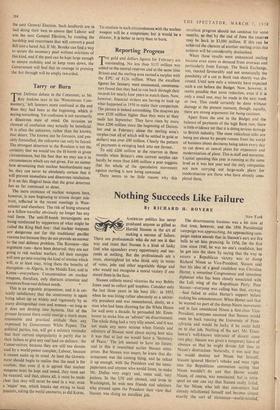Tarry or Burn
FT1HE Defence debate in the Commons, as Mr. 1 Roy Jenkins says in his 'Westminster Com- mentary,' left listeners more confused at the end than they had been at the beginning, which is saying something. Yet confusion is not necessarily a disastrous state of mind. On occasion an clement of confusion may actually be beneficial. It is often the unknown, rather than the known, that deters. The known can be foreseen, and pos- sibly forestalled; the unknown can only be feared. The strongest deterrent to the Russians is not the certainty that we would use the H-bomb in given circumstances, but the fear that we may use it in circumstances which are not given. For no matter how devastating their nuclear bombardment may be, they can never be absolutely certain that it will prevent immediate and disastrous retaliation. It is on this illogical basis that the great deterrent has so far continued to deter.
The mere existence of nuclear weapons here, however, is now beginning to arouse deeper mis- trust, reflected in the recent meetings in West- minster and elsewhere. The risk of being smeared as a fellow-traveller obviously no longer has any real force. The anti-H-bomb intransigents are being reinforced by supporters of what might be called the King Hall line: that nuclear weapons are dangerous not for the traditional pacifist reasons but because they do not provide an answer to the real defence problem. The Russians—this argument runs—have been deterred; they are not going to risk nuclear warfare. All their energies will now go into creating the kind of tension which will, or at least may, bring them the benefits of disruption—in Algeria, in the Middle East, and in Korea—everywhere. Concentration on nuclear weapons, therefore, only distracts attention and resources from real defence needs.
This is an arguable proposition; and it is cer- tainly satisfactory that the controversy is again being taken up so widely and vigorously by so many distinguished men and women—so long as it does not develop into hysteria. Out of the present ferment there could emerge a much more reasonable and practical attitude than any expressed by Government White Papers. The political parties, too, will get a salutary reminder that their current unpopularity is partly due to their failure to give any real lead on defence: the Conservatives; because they are still too domin- ated by a world-power complex; Labour, because it cannot make up its mind. At least the Govern- ment should begin to realise that the need is for caution; that even if it is agreed that nuclear weapons must be kept and tested, they must not be vaunted; and that, above all, it must be made clear that they will never be used in a war, even a 'major' war, which breaks out owing to local tensions, taking the world unawares, as did Korea. To retaliate in such circumstances with the nuclear weapon will be a temptation; but it would be a disaster, It is better to tarry than to burn.


































 Previous page
Previous page